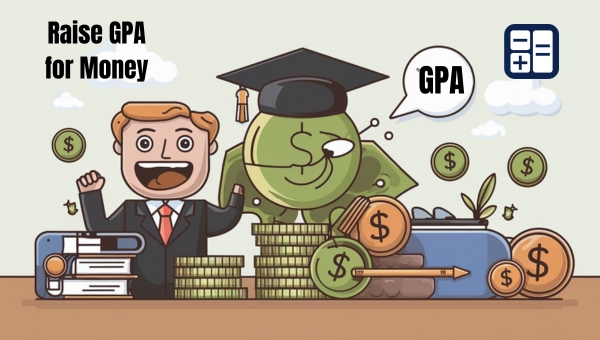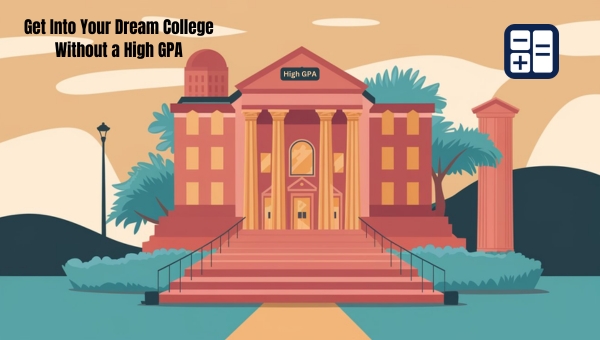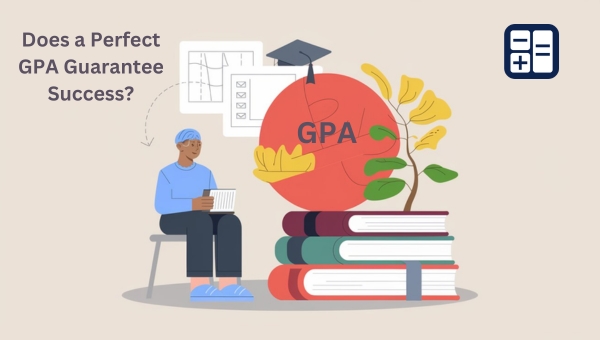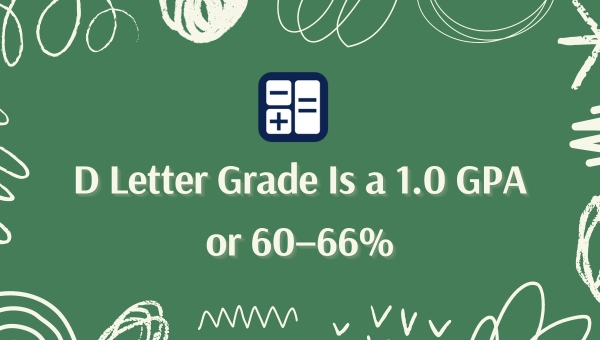3.7 GPA Equals to 90-92% Percentile Grade or A
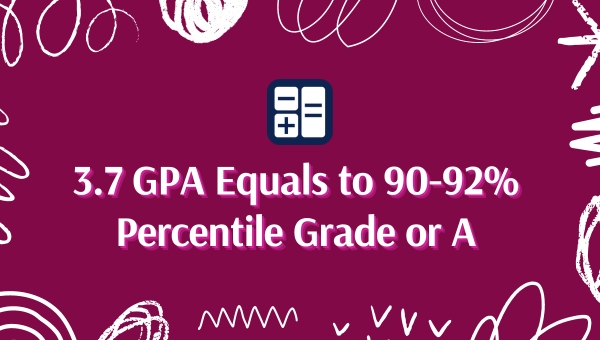
You’re probably wondering how a 3.7 GPA, equivalent to a 90-92% percentile grade, impacts your academic journey. This GPA reflects strong performance, often translating to an A- average, which can significantly enhance your college applications and scholarship opportunities.
But what does maintaining this GPA entail, and how can you achieve or improve it? Understanding the implications and strategies to reach a 3.7 can set you apart from your peers. Let’s explore what this means for your future and the actionable steps you can take to secure this academic milestone.
What is a 3.7 GPA?
A 3.7 GPA signifies a strong academic performance, typically translating to an A- average. When you maintain a 3.7 GPA, you’re showing consistency in achieving high marks across your courses.
Most schools use the 4.0 scale for their GPA calculations, so a 3.7 is very close to the top, reflecting your dedication and hard work.
This GPA often corresponds to a percentile range of about 90-92%. That means you’re outperforming the majority of your peers, placing you in the higher echelons of your class.
Achieving this level of academic success isn’t easy; it requires effective study habits, time management, and a commitment to your education.
In terms of letter grades, a 3.7 GPA typically represents an A- in most courses. However, the exact grade can vary slightly depending on your school’s specific grading policies.
Maintaining a 3.7 GPA can open doors to various opportunities, such as scholarships and competitive academic programs.
Understanding what a 3.7 GPA entails helps you gauge your academic standing and set realistic goals. It’s a commendable achievement that showcases your capabilities and potential for future success.
What does a 3.7 GPA mean for high school students?
With a 3.7 GPA, you’re in a strong position to consider a range of colleges, from safety schools to dream schools. This GPA suggests you’re a dedicated student with consistent performance. Let’s explore how a 3.7 GPA aligns with different types of schools and what it means for your college applications.
Safety Schools
Navigating the college application process with a 3.7 GPA can be both exciting and daunting. You’ve worked hard, and your GPA reflects that effort.
When considering safety schools, it’s essential to identify institutions where your 3.7 GPA will make you a strong candidate. Safety schools are colleges where your academic credentials exceed the institution’s average acceptance criteria, giving you a high likelihood of acceptance.
Here are four key steps to help you choose the right safety schools:
- Research Average GPAs: Look for schools where the average admitted GPA is lower than 3.7. This ensures you stand out as a competitive applicant.
- Check Acceptance Rates: Aim for colleges with higher acceptance rates. Schools with rates above 50% are generally considered safer bets.
- Consider Your Preferences: Even though they’re safety schools, make sure they align with your interests, location preferences, and potential majors.
- Visit and Engage: If possible, visit these schools and engage with current students and faculty to ensure they meet your standards and expectations.
Target Schools
Possessing a 3.7 GPA places you in a solid position when applying to target schools. These institutions are neither too easy nor too difficult for you to get into, making them an ideal focus in your college search. A 3.7 GPA translates to an A- average and signals that you’ve been consistent and diligent in your studies.
When considering target schools, keep these key points in mind:
- Acceptance Rates: Look for schools with acceptance rates between 20-50%. These schools are competitive but attainable with your GPA.
- Programs and Majors: Ensure the colleges offer strong programs in your areas of interest. Your GPA will support your application, but the fit of the program is crucial.
- Extracurriculars and Essays: Highlight your strengths beyond academics. Schools at this level value well-rounded applicants, so showcase your leadership, community service, and unique talents.
- Standardized Test Scores: Aim for SAT or ACT scores that align with the middle 50% range of admitted students at your target schools. A 3.7 GPA is strong, but test scores can bolster your application.
Dream Schools
Dream schools, those prestigious institutions aspiring students often dream about, may seem out of reach with a 3.7 GPA, but don’t be discouraged. Your GPA is just one piece of the puzzle.
Admissions committees consider a variety of factors, and a 3.7 GPA can still make you a competitive candidate if you play your cards right.
Here are four key areas to focus on:
- Extracurricular Activities: Showcase your leadership skills and passions. Whether it’s sports, arts, or community service, depth and commitment matter more than quantity.
- Personal Statement: Craft a compelling narrative that highlights your unique experiences and aspirations. This is your chance to stand out beyond numbers and stats.
- Letters of Recommendation: Secure strong endorsements from teachers or mentors who can attest to your character and academic prowess. Their insights can provide a fuller picture of who you are.
- Standardized Test Scores: Aim for high scores on the SAT or ACT to bolster your application. Many dream schools place significant weight on these exams.
Proven Tips to Get a 3.7 GPA
To achieve a 3.7 GPA, start by prioritizing class attendance and mastering time management skills.
Utilize study groups to reinforce your understanding, and don’t hesitate to seek extra help when needed.
Staying organized digitally will also keep you on track with assignments and deadlines.
Prioritize Class Attendance
When aiming for a 3.7 GPA, prioritizing class attendance is crucial. Attending every class session keeps you engaged with the material and helps you understand concepts as they’re taught. You’ll hear important announcements, get clarity on assignments, and participate in discussions that could enhance your grasp of the subject.
Skipping classes means missing out on the nuances of the lecture, which textbooks can’t always capture. Professors often provide insights and tips that are invaluable for exams and assignments. By being present, you’re showing your commitment and that can positively affect your participation grade, which many professors consider when calculating final grades.
Moreover, regular attendance allows you to build a rapport with your professors. This can be beneficial when you need help or guidance on course material. Plus, professors are more likely to offer extra assistance to students who show up regularly and demonstrate a sincere effort to learn.
Lastly, you’ll find it easier to stay on top of coursework. When you’re consistently in class, you’re less likely to fall behind on lectures and assignments. This proactive approach reduces stress and helps maintain a steady study routine, making that 3.7 GPA more attainable.
Master Time Management
While attending every class lays a solid foundation, mastering time management is the next key step to achieving a 3.7 GPA. Start by setting clear, achievable goals for each week. Break down larger assignments into smaller tasks and set deadlines for each. This way, you’ll avoid the last-minute rush and reduce stress.
Use a planner or digital calendar to map out your schedule. Allocate specific times for studying, attending classes, and completing assignments. Don’t forget to include breaks to recharge. Consistency is crucial, so stick to your plan as closely as possible.
Prioritize tasks by their deadlines and importance. Tackle high-priority tasks first when your energy and focus are at their peak. This approach ensures that you’re making the most of your productive hours.
Eliminate distractions during study time. Find a quiet place, turn off notifications, and stay focused on your work. If you have trouble concentrating, use techniques like the Pomodoro method—work for 25 minutes, then take a 5-minute break.
Lastly, don’t hesitate to seek help if you’re struggling with time management. Academic advisors and tutors can provide valuable advice tailored to your needs. By mastering time management, you’ll be well on your way to achieving that 3.7 GPA.
Utilize Study Groups
Study groups can be a game-changer when aiming for a 3.7 GPA. When you join forces with others, you’re not just pooling knowledge; you’re also enhancing your understanding through discussion. Different viewpoints can illuminate concepts you might’ve missed. By explaining material to others, you’ll reinforce your own grasp of the subject.
In a study group, you benefit from collective accountability. It’s easier to stick to study schedules when others rely on you. You’re less likely to procrastinate when you’ve committed to meet your peers. This structure can keep you on track and ensure you cover all necessary material before exams.
Study groups also allow you to tackle challenging problems together. Two heads are better than one, and a group can brainstorm various approaches to difficult questions. You’ll learn new problem-solving techniques and strategies that you mightn’t discover studying alone.
Lastly, study groups can relieve stress. Sharing concerns with classmates who understand your struggles can be comforting. You’ll realize you’re not alone in facing academic challenges.
Seek Extra Help
A crucial strategy for achieving a 3.7 GPA is to seek extra help whenever you encounter difficulties. Don’t wait until you’re overwhelmed. Reach out to your professors during office hours; they’re there to assist you.
Prepare specific questions to make the most of your time. If you’re struggling with a particular topic, ask for clarification or additional resources that can help you understand the material better.
In addition to professors, utilize teaching assistants (TAs) and academic tutors. Many schools offer free tutoring services, so take advantage of them. Tutors can provide personalized assistance and explain concepts in different ways until they click for you.
Don’t hesitate to ask for help with assignments, as understanding how to tackle them can boost your grades significantly.
Forming relationships with classmates can also be beneficial. Sometimes, a peer can explain something in a way that makes more sense to you. Don’t be afraid to ask classmates for help or to form small study groups focused on challenging subjects.
Stay Organized Digitally
To achieve a 3.7 GPA, staying organized digitally can make a significant difference. Start by using a digital calendar to track all your important deadlines, exams, and class schedules. Google Calendar or Apple Calendar are excellent choices. This will ensure you never miss a deadline and can plan your study sessions effectively.
Next, utilize note-taking apps like Evernote or OneNote. These apps let you organize notes by subject and access them from any device. You can also attach PDFs, images, and even audio recordings. This way, you have all your study materials in one place, making it easier to review.
Don’t forget to use task management tools like Todoist or Trello. These apps help you break down big projects into smaller, manageable tasks. You can prioritize tasks, set reminders, and track your progress. This keeps you on top of your coursework and reduces last-minute cramming.
Backing up your files is crucial. Use cloud services like Google Drive or Dropbox to store important documents. This ensures you can access them anytime, anywhere, and protects against data loss.
How to Raise Your GPA Fast?
Boosting your GPA quickly can feel daunting, but with the right strategies, it’s absolutely achievable. Start by focusing on your current coursework. Prioritize assignments and exams that carry the most weight. Devote extra time to subjects where you struggle, and don’t hesitate to ask for help from teachers or tutors.
Next, improve your study habits. Create a study schedule and stick to it. Break down large tasks into manageable chunks, and use active study techniques like flashcards, summarizing notes, or teaching the material to someone else. Consistency and organization can make a huge difference.
Utilize all available resources. Attend review sessions, join study groups, and use online tools or apps designed to help you study more effectively. Sometimes, just changing your environment can boost productivity—try studying in a quiet library or a different room.
Also, take care of yourself. Ensure you’re getting enough sleep, eating well, and managing stress. A healthy body supports a sharp mind, which is crucial for academic success.
Lastly, communicate with your instructors. They can provide insights into your performance and offer extra credit or additional support. With these strategies, you can see a noticeable improvement in your GPA.
Conclusion
Achieving a 3.7 GPA is a testament to your hard work and dedication. It places you in the 90-92% percentile, showcasing your academic excellence.
This GPA not only strengthens your college applications but also opens doors to scholarships and competitive programs. By following proven tips and staying committed, you can maintain or even raise your GPA. Keep pushing forward—your efforts will pay off in your educational journey.
